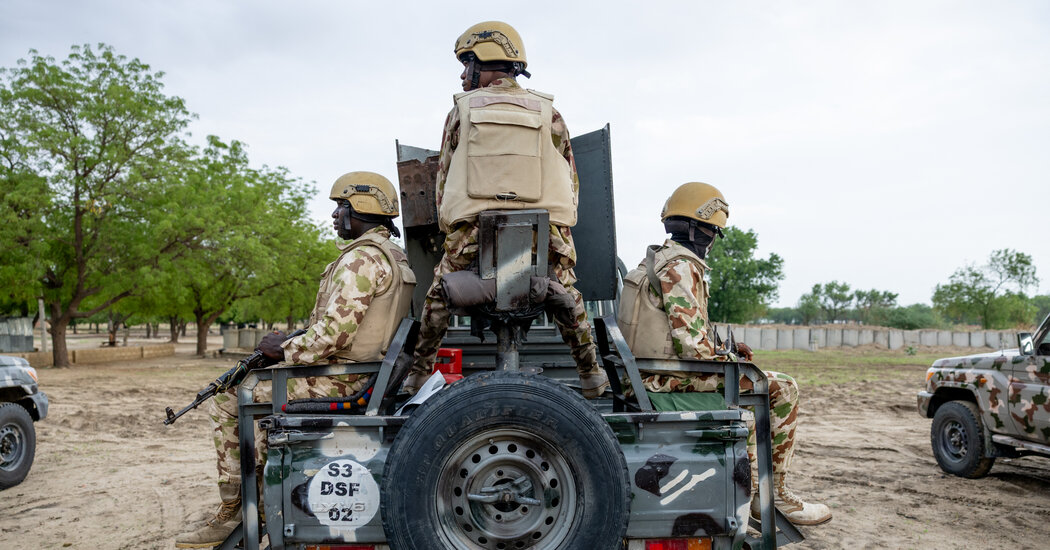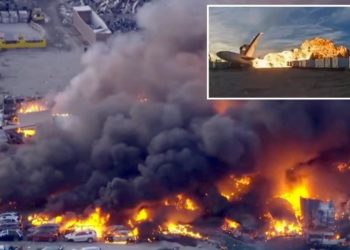First, the self-evident: Despite President Trump’s order that the Pentagon prepare to intervene militarily in Nigeria to protect Christians from attack by Islamic militants, U.S. forces are unlikely to be able to end a decades-long insurgency that has claimed lives across sectarian lines in Africa’s most populous country, military officials say.
The American military cannot do much to quell the violence unless it is willing to start an Iraq- or Afghanistan-style campaign, the officials said, something that no one appears to be seriously contemplating. But they said there were some steps available to American war planners that could have limited impact on the militants.
The Air Force could conduct airstrikes on the few known compounds in northern Nigeria inhabited by militant groups, officials said. American drones like the MQ-9 Reaper and the MQ-1 Predator could attack a few vehicles and even a handful of convoys. And American forces could team up with Nigerian soldiers to raid villages to root out insurgents who have ensconced themselves in rural hamlets in the country’s north.
These were all part of the options that officials with United States Africa Command drew up this week, defense officials say, to forward to the Joint Staff at the Pentagon. They generated the plans after Mr. Trump’s announcement over the weekend threatening military action to stop what he described as attacks on “CHERISHED Christians” but in reality is a campaign of violence and land disputes that have killed thousands of Muslims and Christians alike.
Militant groups like Boko Haram and the Islamic State West Africa Province have targeted Christians in Nigeria, along with many Muslims accused of not being devout enough. Any major military operation by the United States would be likely to fail, current and former military officials said.
“It would be a fiasco,” said Maj. Gen. Paul D. Eaton, a retired Army veteran of the war in Iraq and U.S. efforts to counter the insurgency there. The American public had not shown much interest in repeating the Iraq- or Afghanistan-style military campaigns in Nigeria, he noted. Nor had the president, beyond his recent social media posts.
Any potential effort by Mr. Trump to direct the military to target Nigerian insurgents through his preferred method — airstrikes — would be likely to cause shock and awe but not much more, military officials said. General Eaton likened such an effort to “pounding a pillow.”
Current and former military and national security officials, including those with experience fighting Islamic militant groups in West and Central Africa, said Mr. Trump’s latest directive had left them stumped.
“I am hereby instructing our Department of War to prepare for possible action,” Mr. Trump wrote in a social media post on Saturday. Defense Secretary Pete Hegseth was quick to respond, also on social media. “Yes, Sir,” he wrote.
Mr. Hegseth’s office quickly directed Africa Command to send plans for possible strikes.
Officials at the command, which is based in Stuttgart, Germany, and which like much of the U.S. military apparatus has plans for every conceivable contingency, duly dusted off their options for the Sahel and sent them to Washington. The new AFRICOM commander, Gen. Dagvin R.M. Anderson, has a previously scheduled trip to Nigeria in the next month or so.
Three defense officials said the plans from the command had three options — light, medium and heavy — and were intended to be escalatory.
The light option, the officials said, included what the military called partner-enabled operations. Under that option, the U.S. military and the State Department would support government forces in Nigeria to target Boko Haram and other Islamic insurgents who have attacked, kidnapped and murdered civilians, mostly in northern Nigeria, where sectarian and ethnic violence has raged for almost 20 years. The United States would have to conduct these operations without the expertise of the U.S. Agency for International Development, whose office in Abuja, the capital, officially closed in July, after the Trump administration shuttered the agency.
But that action would come with a host of issues, the thorniest being that the violence in the northern Nigerian Sahel falls along linguistic, cultural and religious lines. Much of it is based on land use and tenure and is fomented in some cases by corruption in the Nigerian government. Farmers and herders in the region have battled one another over land use for decades, and militant Islamic groups have taken advantage of the distrust to push their own agenda.
Boko Haram has attacked, kidnapped and killed both Christians and Muslims. Previous American governments provided Nigeria with intelligence and security to help target the group but balked at selling some weapons because of concerns over human rights abuses by the Nigerian military.
The medium option being put forward by Africa Command, officials said, includes drone strikes on militant camps, bases, convoys and vehicles in northern Nigeria. American Predator and Reaper drones can loiter for hours before striking, and other U.S. intelligence can gather information on specific targets’ pattern of life.
But that option comes with its own issues, not least being that the U.S. military in August vacated its two nearest drone bases, in Agadez and Niamey, both in neighboring Niger. Russian forces now occupy those bases.
Drones launched from Niamey or Agadez could reach Nigeria in an hour, one military official said. But now, the closest known places from which the United States could launch drones are southern Europe and perhaps Djibouti, in East Africa, where the U.S. military has a large base.
One official suggested that West African countries seeking favor with the Trump administration might allow their territories to be used, but that is less clear. Doing so would also go against the wishes of the Nigerian government, which is hugely influential on the continent, and could open up another set of problems for neighboring countries.
The Nigerian government has said it welcomes U.S. assistance in targeting Islamist insurgents but added the caveat that any action must respect Nigeria’s sovereignty and its territorial integrity.
The heavy option, military officials said, would be to move an aircraft carrier group into the Gulf of Guinea and to deploy fighters and perhaps long-range bombers to conduct strikes deep in northern Nigeria. But the United States is already in the process of moving one of its aircraft carriers, the Gerald R. Ford, from its deployment in Europe to the southern Caribbean, where Mr. Trump has declared war on drug cartels. Other aircraft carriers are currently deployed in the Pacific or in the Middle East or are undergoing maintenance.
Deploying an American aircraft carrier to the Gulf of Guinea to take on Islamic insurgents in Nigeria was not deemed to be a 2025 national security priority as recently as Friday, several military officials said.
Eric Schmitt contributed reporting.
Helene Cooper is a Pentagon correspondent for The Times. She was previously an editor, diplomatic correspondent and White House correspondent.
The post U.S. Military Draws Up Nigeria Plans, With Limited Options to Quell Violence appeared first on New York Times.




